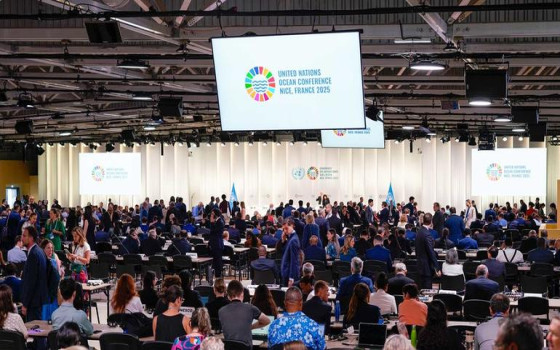
A UN conference in Nice, France, examines the growing threats to the oceans, including collapsing fish stocks, overconsumption, illegal fishing, and pollution.

- Europe and Arabs
- Tuesday , 10 June 2025 12:47 PM GMT
Brussels - Nice: Europe and the Arabs
UN Secretary-General António Guterres said that the ocean is our ultimate shared resource, "but we are failing it," calling for ocean priorities to be integrated into climate, food, and sustainable finance systems, "because without a healthy ocean, there can be no healthy planet."
This came in a speech delivered by Guterres on Monday at the opening of the UN Ocean Conference, hosted in Nice, France, and co-organized by France and Costa Rica, which continues until June 13, 2025.
The Secretary-General detailed the growing threats to the oceans, including collapsing fish stocks, overconsumption and illegal fishing that are pushing marine life to the brink, the 23 million tons of plastic waste entering the waters annually, carbon pollution that is acidifying ocean waters, and deadly heat. According to the UN Daily News, he also warned that "rising sea levels are submerging deltas, destroying crops, swallowing coastlines, and threatening the survival of many islands." He added that these are "symptoms of a broken system" and that they feed on each other.
The Secretary-General highlighted the growing insecurity, not only due to natural forces, but also to criminal forces, adding: "Piracy, organized crime, human trafficking, and the plundering of natural resources threaten people's lives, undermine development, and deprive coastal communities of their rights."
The UN Secretary-General spoke about the progress made since the previous Ocean Conference in Lisbon, pointing to the Kunming-Montreal Global Biodiversity Framework and the landmark agreement on marine biodiversity beyond areas of national jurisdiction.
"This demonstrates the power of multilateralism, but only if words are matched by action, through concrete national plans aligned with global goals, and through the empowerment of fishers, indigenous peoples, scientists, and young people," Guterres said. He pointed out that Sustainable Development Goal 14, "Life Below Water," remains one of the least funded Sustainable Development Goals, stressing that "this situation must change, through increased public funding, greater support from development banks, and bold models to unleash private capital," calling on all countries to make bold pledges.
Hope for a Change of Course
The UN Secretary-General called for "strengthening maritime security as a fundamental pillar of sustainable development." He noted that countries are also venturing into new areas of seabed mining, adding that he supports the ongoing work of the International Seabed Authority on this important issue. The Secretary-General said there is an opportunity to restore marine abundance, adding: "What was lost in one generation can be restored in another."
He expressed his hope that "we can change the course of things, that we can move from plunder to protection, from exclusion to equity, from short-term exploitation to long-term care." Declaration of Peace with the Ocean
More than 50 heads of state and government participated in the opening ceremony, including Brazilian President Luiz Inácio Lula da Silva and European Commission President Ursula von der Leyen, in a show of political power that underscored the summit's importance. In total, more than 120 countries are participating in the five-day gathering.
French President Emmanuel Macron, whose country is co-hosting the summit with Costa Rica, issued a strong call for science, law, and multilateral resolve.
In his address, he said, "Greenland is not for sale, just as Antarctica or the high seas are not for sale," adding that "if the Earth's temperature rises, the ocean boils."
He emphasized that the fate of the seas cannot be left to markets or public opinion, saying, "Therefore, the first response is multilateralism. Climate, like biodiversity, is not a matter of opinion, but of proven scientific facts."
Costa Rican President Rodrigo Chávez Robles then spoke, thanking the UN Secretary-General for placing the ocean on the global agenda. He then issued a stark warning, saying, "The ocean speaks to us with bleached coral reefs, storms, and wounded mangroves. There is no longer time for rhetoric. Now is the time for action."
Chávez condemned decades of treating the ocean as "an endless storehouse and global garbage dump," and urged a shift from exploitation to stewardship. "Costa Rica is a small country, but this change has begun. We are now declaring peace with the ocean," he said.
He called for a moratorium on deep-sea mining in international waters until science can adequately assess the risks, a position he noted is already supported by 33 countries.
Global Agreements and New Pledges
One of the summit's primary goals is to help implement the landmark High Seas Treaty, adopted in 2023 to protect life in international waters. The treaty requires 60 ratifications to become binding international law. The French president declared that this achievement was within reach. He said, "In addition to the approximately 50 ratifications presented here in the last few hours, 15 countries have formally committed to joining it. This means that the political agreement has been reached, which allows us to say that this treaty will be properly implemented." The French president added that whether the legal threshold is crossed this week or shortly after, "it is a victory."












No Comments Found